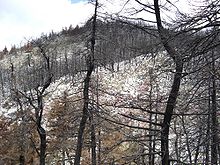Forest fires in Greece 2007
The 2007 forest fires in Greece were among the worst in decades. Forest fires broke out in several regions of Greece in late August 2007 and spread rapidly and intensified rapidly. In addition to the Attica region and the island of Evia , the Peloponnese was particularly affected, where more than 190 fires were reported as of August 24. A heat wave with maximum temperatures of 40 ° C and strong winds up to wind force 8 promoted the spread; in most cases arson is believed to be the cause. By the evening of August 27th, 70 deaths were counted across Greece. Most of the victims were caused by the fires in the Peloponnese, at least 30 people died in the flames in the vicinity of the city of Zacharo alone .
The Greek Prime Minister Kostas Karamanlis declared a nationwide state of emergency on August 25, 2007 . Several hundred soldiers were assigned to support the fire brigades , and the European Union promised its support. Several countries, including France, Spain, Germany and Austria, pledged their support with fire-fighting planes and fire-fighting helicopters. Some countries, including Germany and Sweden, have asked for money for their work. On August 26th, the forest fires threatened the ancient sites of Olympia . A destruction of the facilities could apparently only be averted at the last minute by concentrating the emergency services. By then, more than 180,000 hectares of land had been destroyed, including hundreds of lemon and olive plantations; dozens of villages have been completely destroyed, and countless wild and farm animals have died in the flames.
On August 29, 2007, more than 30 major fires were still not under control and continued to threaten various towns and villages. The far-reaching consequences of this major fire disaster for the region's climate cannot yet be foreseen. According to eyewitness reports, large stretches of land in the west and southwest of the region look like "volcanic or lunar landscapes". Many of these fires have their origin in negligent or criminal arson, for example in favor of land speculation by real estate investors. So far, some suspected arsonists have been arrested by the Greek police authorities, and the state has advertised arrest funds up to one million euros.
In general, around 97% of forest fires in low-lying areas (below 1000 m above sea level) are triggered by humans; therefore arson, negligence, poor crisis management by the authorities and poorly equipped fire brigades are the focus of the root cause research. Between 1982 and 1998, around 8.75 million hectares of forest were burned in Greece, of which 1.03 million hectares were reforested.
Web links
Individual evidence
- ↑ tagesschau.de : Desperate Appeals in Greece (tagesschau.de archive), accessed on August 26, 2007.
- ↑ Rheinische Post : Greece declares a nationwide state of emergency ( page no longer available , search in web archives ) Info: The link was automatically marked as defective. Please check the link according to the instructions and then remove this notice. , dated August 25, 2007.
- ↑ N24 .de: Forest fires not yet under control ( memento from September 26, 2007 in the Internet Archive ), from August 26, 2007.
- ↑ welt.de
- ↑ tagesschau.de: Ancient Olympia probably saved (tagesschau.de archive) , from August 26, 2007.
- ↑ Robert Brandes: Forests and forest fires in Greece - A consideration from a vegetation-geographical point of view. In: Hellenika. Yearbook for Greek Culture and German-Greek Relations. New episode 3, LIT Verlag, Münster 2008, ISBN 978-3-8258-1800-5 , p. 70 ff. (Online)
- ↑ Hubert Eich Hein: Greece . 2nd (updated) edition. Verlag CH Beck, Munich 1999/2006, ISBN 3-406-39877-4 , p. 58 (online)

